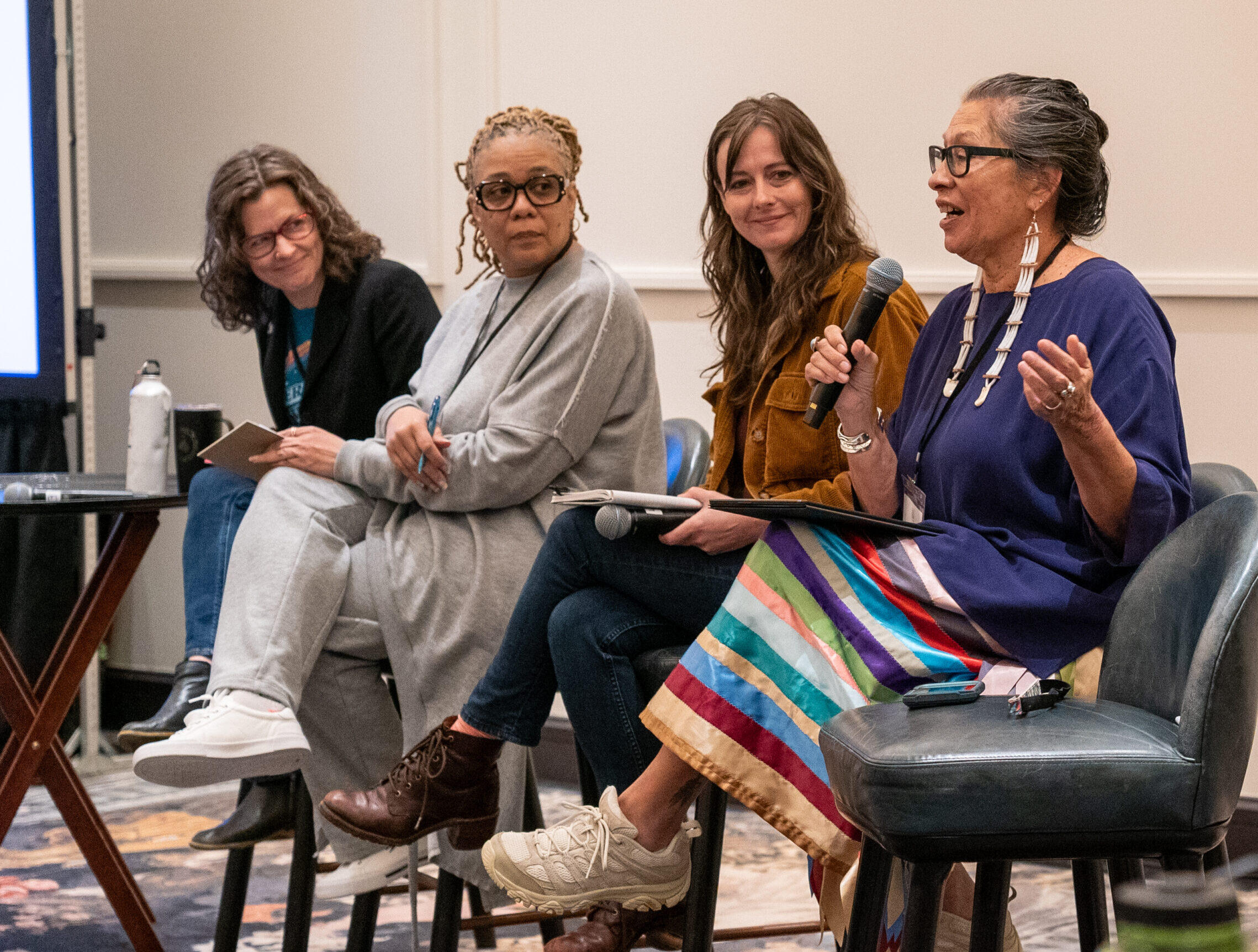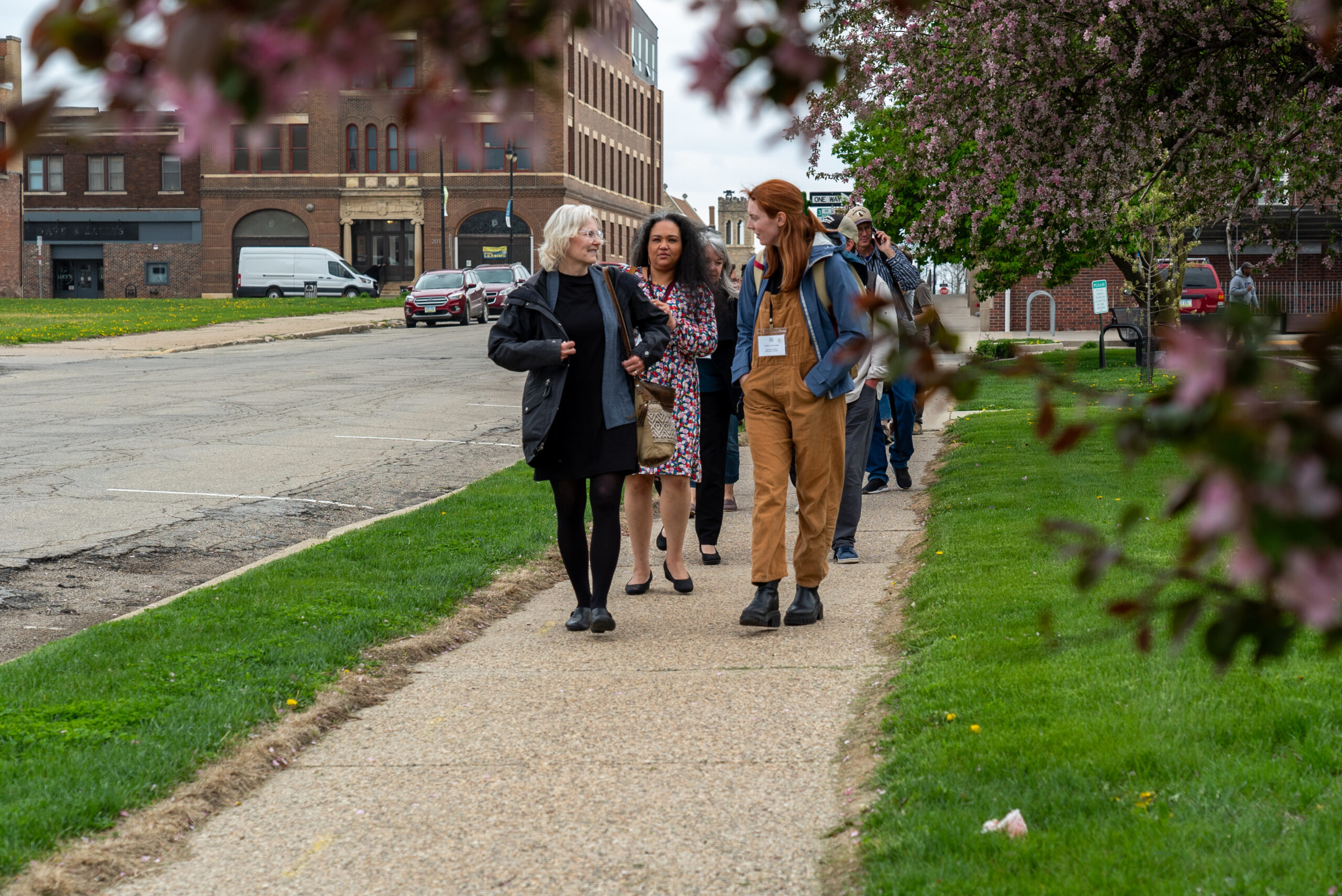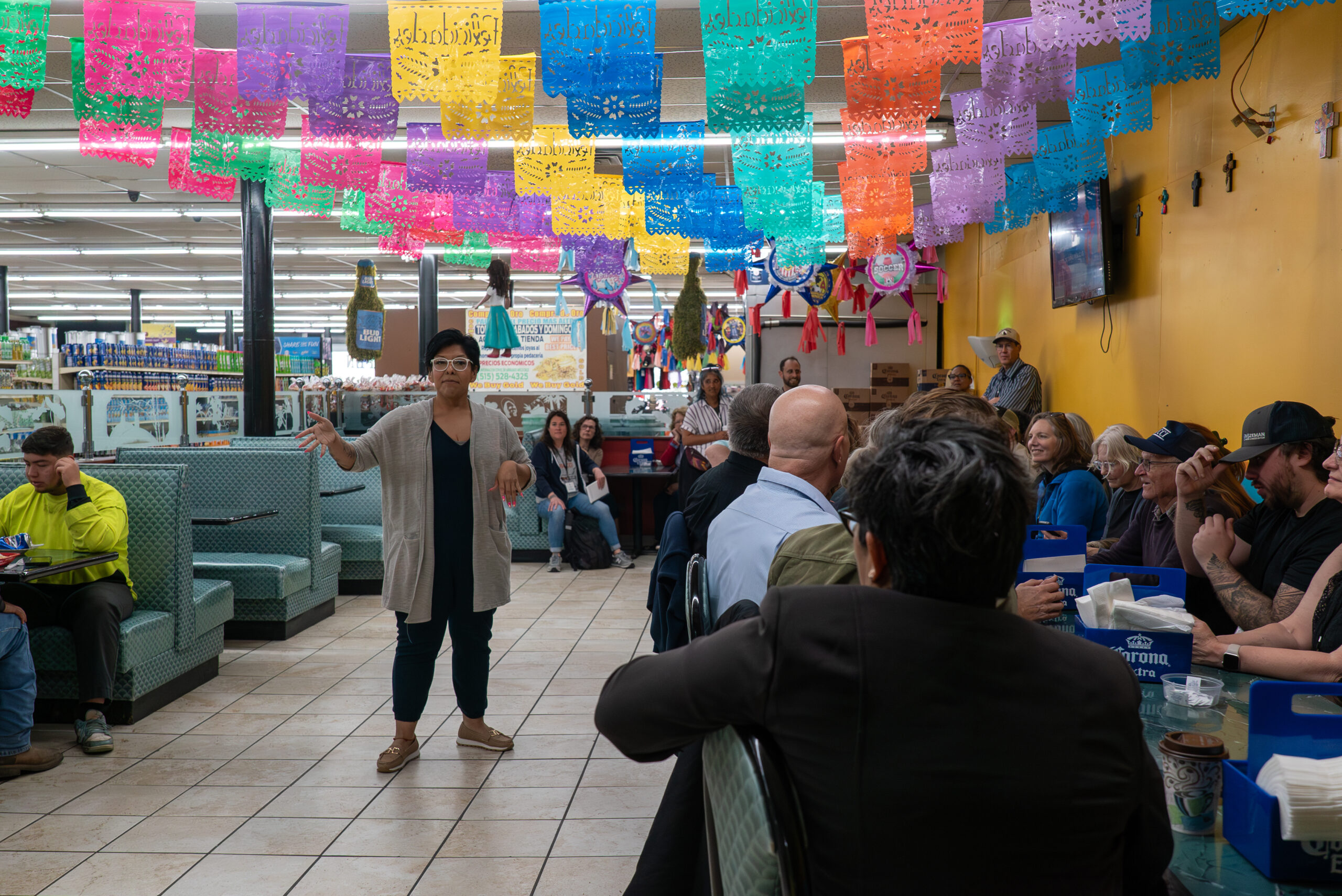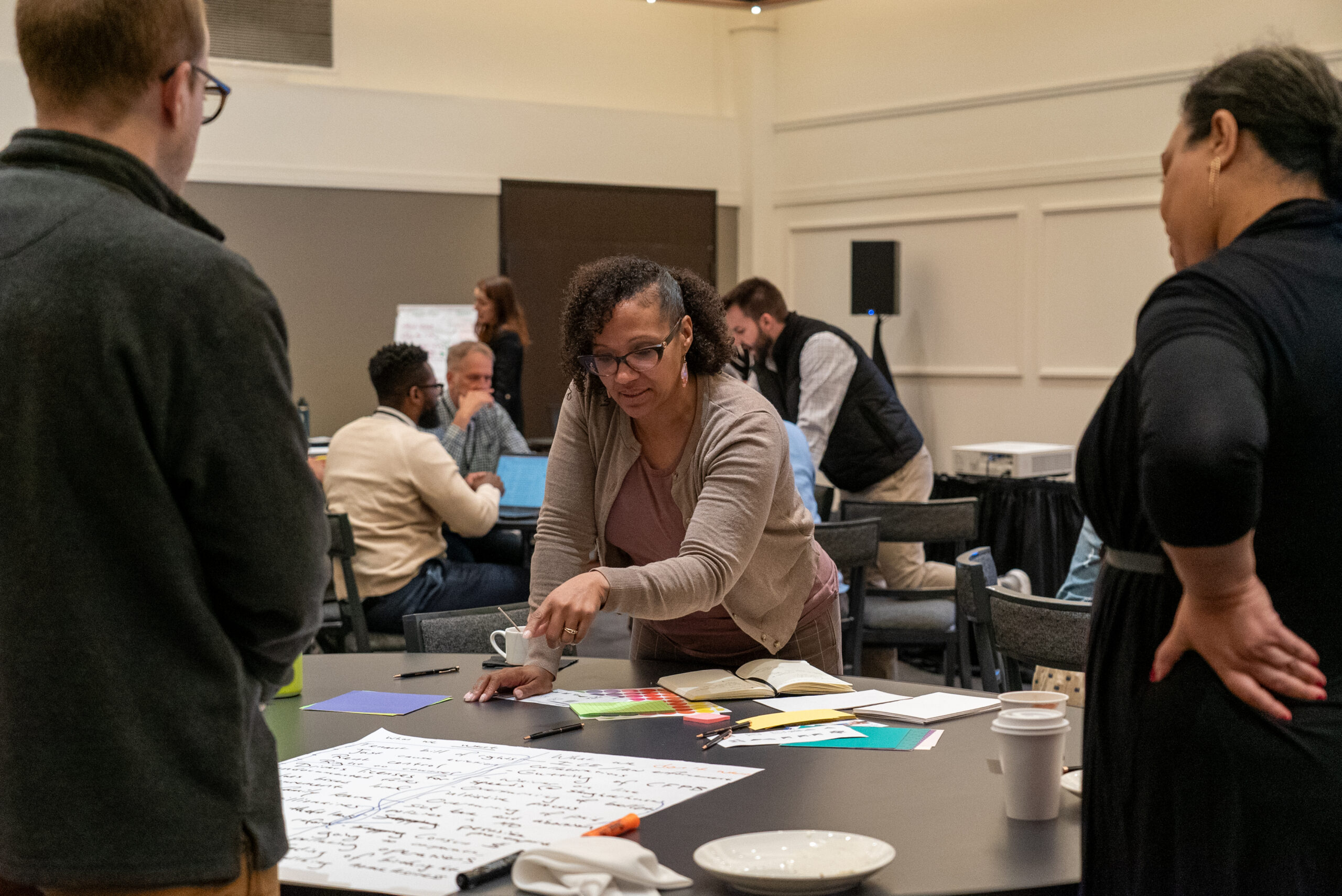RURAL LEADERS GATHER TO SHAPE POLICY AND IMPROVE PEOPLE’S LIVES
Des Moines, Iowa | May 1, 2025
Rural leaders and advocates gathered in Des Moines for the 2025 Rural Policy Action Summit. People from over 50 organizations, from as far as Maine, Florida, Arizona, and Washington, convened in the Heartland for the third bi-annual event. Participants noted the resourcefulness, ingenuity, and commitment of people in rural communities and small towns. They called for federal and state governments to remove barriers and invest in our communities, and expressed frustration about corporate consolidation and the undue influence of the ultrawealthy.

Panel Discussion with Judith LeBlanc, Native Organizers Alliance; Kate Hess Pace, Hoosier Action Resource Center, Archbishop Marcia Dinkins, Black Appalachian Coalition, and Siena Chrisman, State Innovation Exchange
“The backdrop to our meeting is that the current leadership in DC is trying to give more lavish tax breaks to the wealthy and corporations and pay for them with devastating cuts to our healthcare and education, breaking contracts with small farmers, giving away public land, and gutting programs that support rural people,” said Sarah Jaynes of the Rural Democracy Initiative. “We’re convening the Rural Policy Action Summit so rural people can shape the decisions about the places we call home.”
We’re convening the Rural Policy Action Summit so rural people can shape the decisions about the places we call home.
The summit was hosted by Rural Democracy, Iowa Citizens for Community Improvement, American Federation of Teachers, Black Appalachian Coalition, Native Organizers Alliance, Northern Plains Resource Council, State Innovation Exchange, and Wisconsin Farmers Union.
BROAD COALITIONS & PROGRESS
This year’s summit focused on people-powered solutions for working families. People shared successful community-driven campaigns to stop exorbitant utility rate hikes in Montana, establish paid family leave in Missouri, and protect a beloved nursing home in Wisconsin. Building on this momentum, participants spoke to the importance of advancing federal policy to ensure a safe work environment and other policies that support working families. Across sessions, speakers shared stories of rural people’s determination and commitment. They are building broad coalitions to shape policy, address urgent needs, and plan for the future.
“Rural people are leading with creativity, grit, and vision,” said Caitlin Cromwell, Director of Organizing at the Northern Plains Resource Council. “This summit showed what’s possible when we come together to share what’s working and fight for the future we all deserve. Across the country, we face many of the same challenges, and just like we do in our local communities, we’re here building relationships to make our work stronger.”


Participants traveled to Marshalltown, Iowa where local leaders spoke to the critical needs of small businesses and the contributions of immigrants to the economy.
Marshalltown residents were deeply impacted by the 1980s farm crisis, the massive and disruptive detention of immigrants in 2006, and a destructive windstorm with 99 mile per hour winds in 2020. But, they chose to emphasize their hard work and care for each other and proudly shared their successful small businesses, family farms, cultural programs, and educational success. They also spoke to the foundational nature of public education, disaster recovery funds, and immigration programs like the 1980s amnesty program and the more recent Deferred Action for Childhood Arrivals (DACA). These programs bolster entrepreneurship and economic growth.
“Our rural communities are critically important, and folks hold a deep connection to these places too often overlooked by folks in D.C.,” said Lisa Whelan, Executive Director of the Iowa Citizens for Community Improvement. “Iowa CCI was honored to help host this powerful convening that reinforced the power of everyday people to take control of their neighborhoods and towns, and that across race and place we share more in common than what might seem different. We all want and deserve a say in policy that impacts the people and places we love, and that’s worth fighting for.”
DECISION MAKING POWER
Resilience, community investment, and decision-making power echoed throughout the summit. People from sovereign Tribal nations spoke to the unique needs and opportunities for sovereign nations. Many Tribal nations are the key driver for the regional economy and have used their power to protect public resources that benefit everyone, such as clean water. Yet, Native Americans are facing attacks on their treaty rights, and the Trump administration has called for taking away their voting rights.
In sessions covering topics from “Land, Labor, and Rural Belonging” to “Prioritizing in a Time of Chaos,” participants called for policies that return power and resources to rural communities.
“In conversations with farmers, small business owners, and union members, a common concern stood out: too often, the rules are rigged in favor of massive corporations and the ultra-wealthy,” said Melissa Cropper, president of the Ohio Federation of Teachers & AFT vice president. “Rural communities rely on strong labor protections and public institutions—our hospitals, our schools—to thrive. We need public investment that strengthens rural infrastructure, safeguards good union jobs, and stops the wave of privatization and closures that threaten the very heart of our communities.”

In conversations with farmers, small business owners, and union members, a common concern stood out: too often, the rules are rigged in favor of massive corporations and the ultra-wealthy
“Federal policy has encouraged corporate consolidation, pushed many farmers out of business and drained local resources,” said Julie Bomar, Executive Director of the Wisconsin Farmers Union. “We need better policy to level the playing field so farmers and small businesses can compete.”
Throughout the summit, leaders emphasized how policies must reflect the real conditions in rural places. For example, cuts to Medicaid or adding barriers to enrollment will lead to more people without healthcare. It will also further strain rural hospitals, causing hospital closures and job loss.
“The gutting of critical programs at the federal level is further harming rural communities that have already seen decades of disinvestment,” Siena Chrisman, Agriculture & Food Systems Research Director at State Innovation Exchange said. “In this time of federal chaos, state policymakers can work alongside rural leaders to support investment in rural health care, education, farmland, and everything else that make rural communities great places to live and work. It’s critical to stop this downward spiral and put us on the right track.”
state policymakers can work alongside rural leaders to support investment in rural health care, education, farmland, and everything else that make rural communities great places to live and work.
Iowa State Representative J.D. Scholten spoke at the summit and shared how rural lawmakers can challenge corporate power, even from the minority. He spoke to the federal government’s power to rein in giant corporations and how the consolidation of fertilizer manufacturers has hurt Iowa farmers and consumers. He helped highlight the issue and organize federal action.
The Third Rural Policy Action Summit
The 2025 summit continued the progress sparked by the 2021 and 2023 Summit, which culminated in the creation of the 2021 and 2023 Rural Policy Action Report. These reports identify top rural policy priorities and have been widely shared with lawmakers, advocates, and decision-makers working to advance rural equity and opportunity.